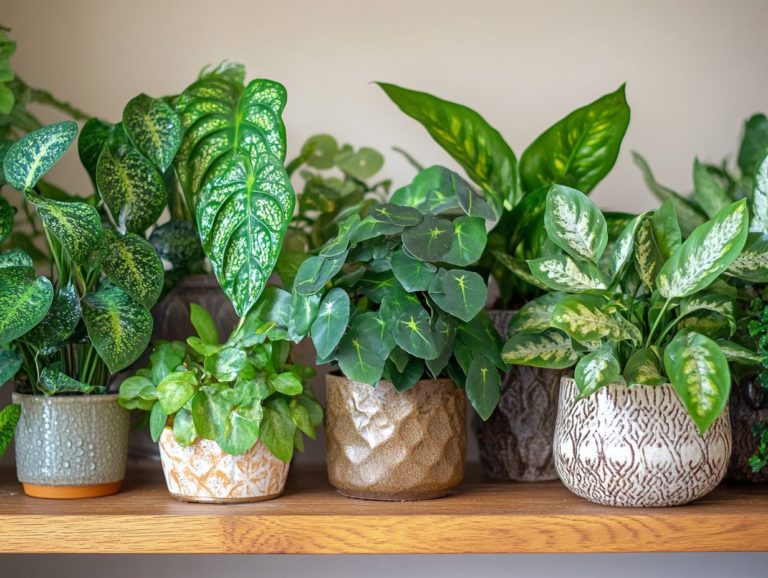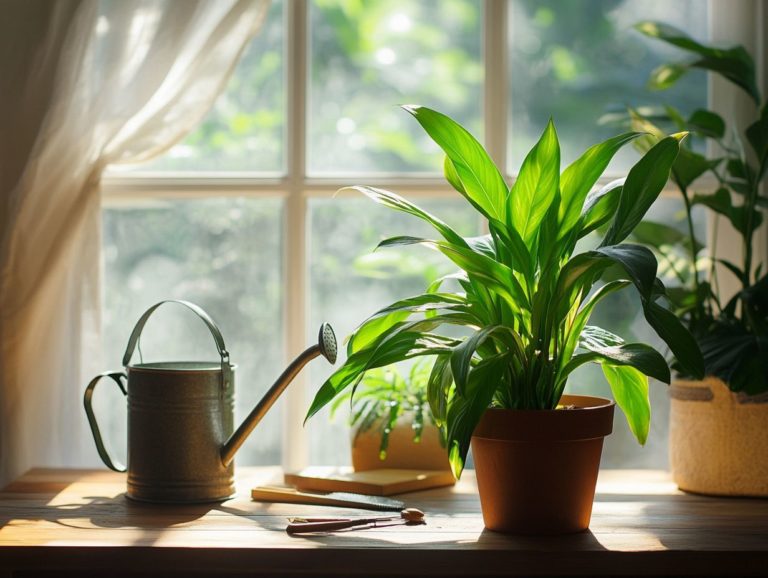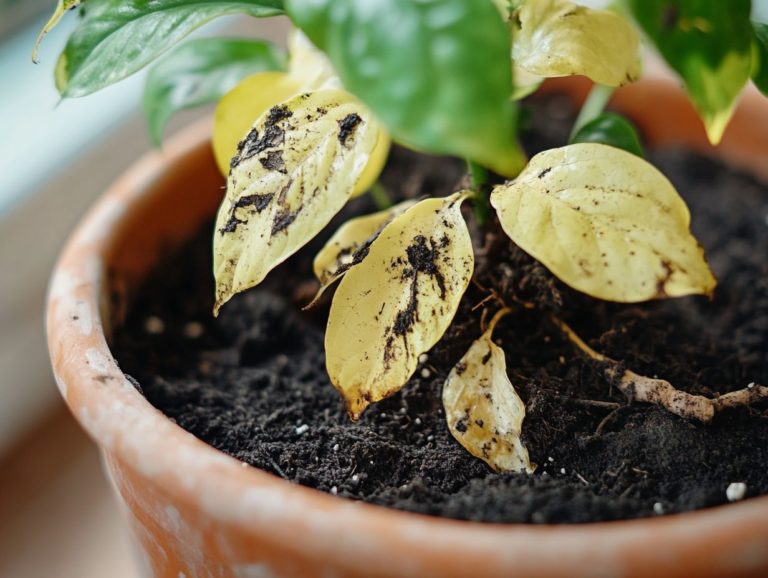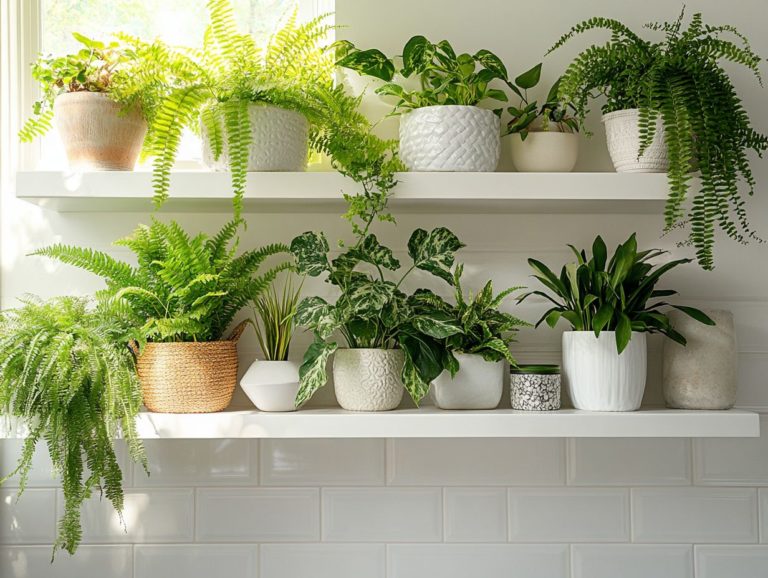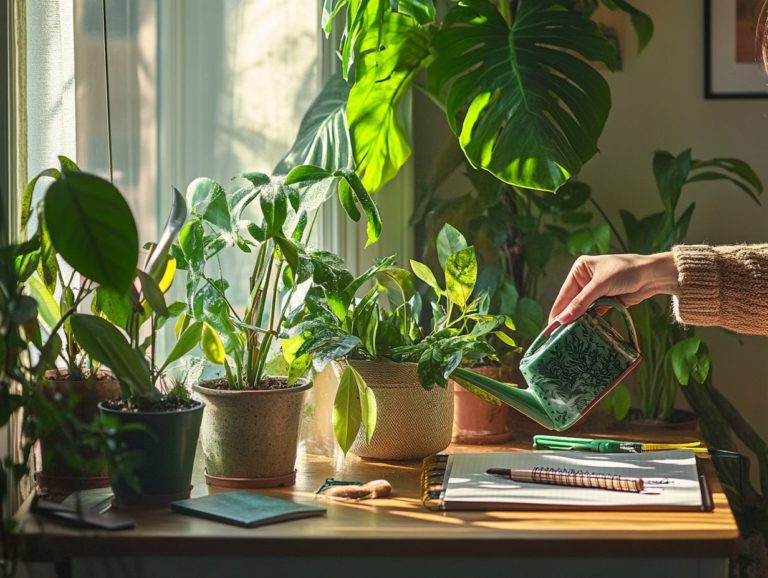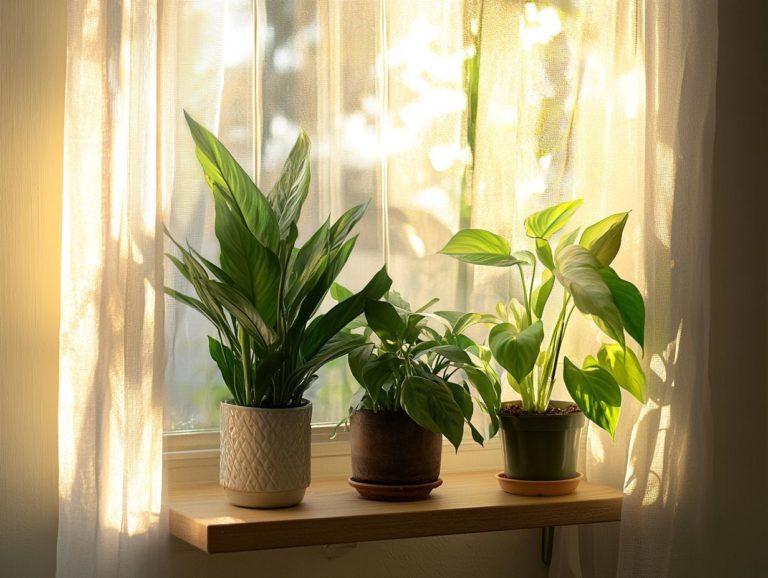Can I Use Tap Water for Indoor Plants?
When nurturing your indoor plants, the water you choose is essential for their health and growth.
Many plant enthusiasts often ponder the implications of using tap water, which frequently contains a variety of chemicals and minerals. This article delves into the components of tap water, examining its potential effects on your plants, and presents alternatives that can foster optimal growth.
You’ll discover practical tips to mitigate any negative impacts if you decide to continue using tap water. Get ready to create a vibrant indoor garden that flourishes!
Contents
- Key Takeaways:
- Understanding Tap Water and Its Components
- Potential Effects on Indoor Plants
- Alternatives to Tap Water for Indoor Plants
- Tips for Using Tap Water for Indoor Plants
- Frequently Asked Questions
- Can I Use Tap Water for Indoor Plants?
- What are the things I should keep in mind when using tap water for indoor plants?
- Can I use tap water directly from the faucet for my indoor plants?
- What if I live in an area with water that has a lot of minerals?
- Are there any benefits to using tap water for indoor plants?
- Should I use tap water for all types of indoor plants?
Key Takeaways:
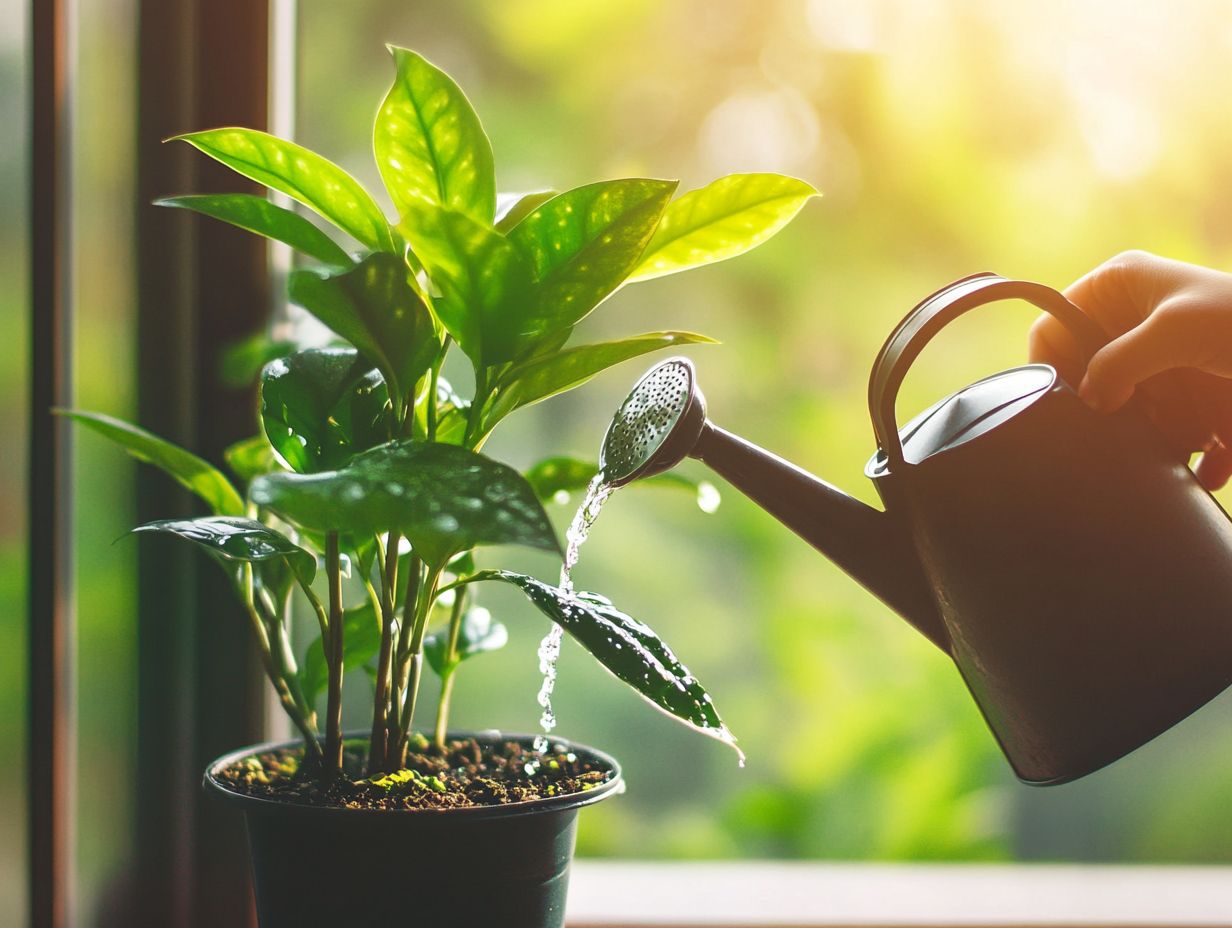
- Using tap water can harm your indoor plants due to harmful chemicals and minerals.
- The use of tap water can negatively affect plant growth, leading to issues like stunted growth and yellowing leaves.
- To promote healthier plant growth, consider using alternatives like filtered water or rainwater for watering indoor plants.
Understanding Tap Water and Its Components
Grasping the intricacies of tap water and its components is essential for indoor gardening enthusiasts, especially those nurturing houseplants. The quality of water directly impacts plant health and growth.
Tap water commonly harbors a variety of minerals and chemicals, including chlorine, calcium, magnesium, and sodium. Each of these plays a role in shaping water quality and hardness. Being well-informed about these elements is vital for establishing the best watering practices for your potted plants, ensuring that you create optimal conditions for growth particularly for delicate plants that demand specific nutrient levels.
Chemicals and Minerals in Tap Water
Tap water is a cocktail of various chemicals and minerals, including chlorine, calcium, magnesium, and sodium. These components can significantly influence the health of your houseplants.
Understanding the role of each of these components is essential for nurturing thriving plants. Chlorine, commonly used as a disinfectant in city water, can harm sensitive species, potentially causing leaf burn or stunted growth if not carefully regulated. In contrast, calcium and magnesium are your allies, contributing to nutrient absorption and promoting structural integrity, leading to stronger stems and more vibrant foliage.
Striking the right balance among these minerals is crucial. While tap water can provide essential nutrients, opting for filtered water or rainwater might offer a gentler alternative, minimizing harmful chemicals and creating an ideal environment for your plants’ growth.
Potential Effects on Indoor Plants
The impact of tap water on your indoor plants can be significant, influencing their growth, leaf health, and overall vitality. Although tap water is undeniably convenient, the presence of chlorine and various minerals can create complications such as yellowing leaves, root rot, and drainage issues in your potted plants.
Recognizing these effects is crucial for fine-tuning your watering schedules and ensuring the health of popular varieties like pothos, peace lilies, and ZZ plants, each of which may have distinct water preferences.
How Tap Water Can Affect Plant Growth
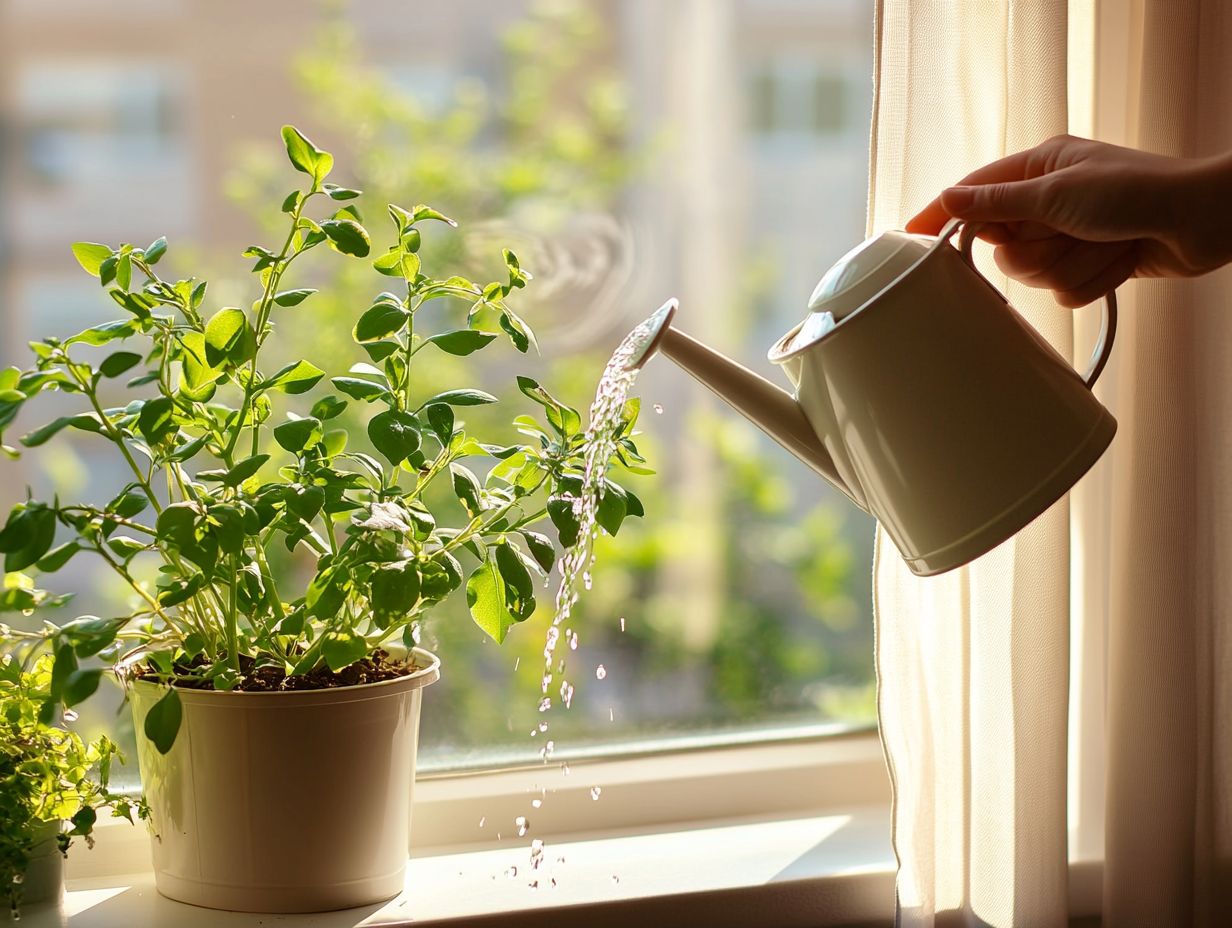
Tap water can significantly influence your plants’ growth by affecting nutrient absorption, or how plants take in nutrients from the soil, and overall water quality. This may result in issues like yellowing leaves and root rot.
Many plants flourish when the water they receive is free from harsh chemicals and has a balanced mineral content. For example, the high levels of chlorine often found in city tap water can disrupt the delicate nutrient balance in the soil, negatively impacting sensitive plants like ferns and orchids that struggle with environmental fluctuations.
To counteract these adverse effects, let tap water sit for at least 24 hours before using it, allowing chlorine to dissipate. Implementing a water filtration system can also enhance overall water quality. Regular testing for essential minerals helps create optimal growing conditions for both your houseplants and garden varieties.
Start using these tips today to transform your indoor garden into a lush green haven!
Alternatives to Tap Water for Indoor Plants
When assessing the well-being of your indoor plants, it’s essential to explore alternatives to tap water. Options such as filtered water, rainwater, and even aquarium water can significantly enhance the quality of the water you provide, meeting their specific plant needs.
These alternatives reduce harmful chemicals and improve nutrient availability. This creates ideal conditions for your houseplants to flourish. By knowing the benefits of choosing the right water for indoor plants, you can create a vibrant indoor garden, free from the common pitfalls linked to tap water.
Options for Safer Watering
Want to keep your plants healthy? Effective watering tips can make all the difference! You have several options for watering your indoor plants safely. Filtered water and rainwater stand out as exceptional choices that can elevate water quality and enhance your plant care routine, especially for more delicate species.
Using these methods minimizes the risk of harmful chemicals often found in tap water. They also deliver essential nutrients that foster healthier growth. If you re considering filtering tap water, a simple carbon filter can remove chlorine and sediment, making it a much better fit for your delicate foliage.
Collecting rainwater is another brilliant strategy. It provides soft, unchlorinated water that many plants absolutely thrive on. Setting up a rain barrel is a simple yet effective way to gather this precious resource.
Additionally, aquarium water, rich in beneficial nitrates, serves as a fantastic alternative for plants like ferns and pothos. This allows you to recycle nutrients while keeping your greenery lush and vibrant.
Tips for Using Tap Water for Indoor Plants
It s crucial to implement effective watering tips to mitigate any potential negative impacts on water quality. Understanding your plants’ unique watering methods will significantly benefit their growth.
By understanding the specific water preferences of various plant types and adjusting for the amount of chlorine in the water, you can make a significant difference in their well-being. Establishing a consistent watering schedule will ensure that you meet their unique plant personalities.
Prioritizing care through informed watering practices helps prevent common issues like root rot and yellowing leaves. This ultimately fosters robust growth for your beloved plants.
How to Minimize Negative Effects
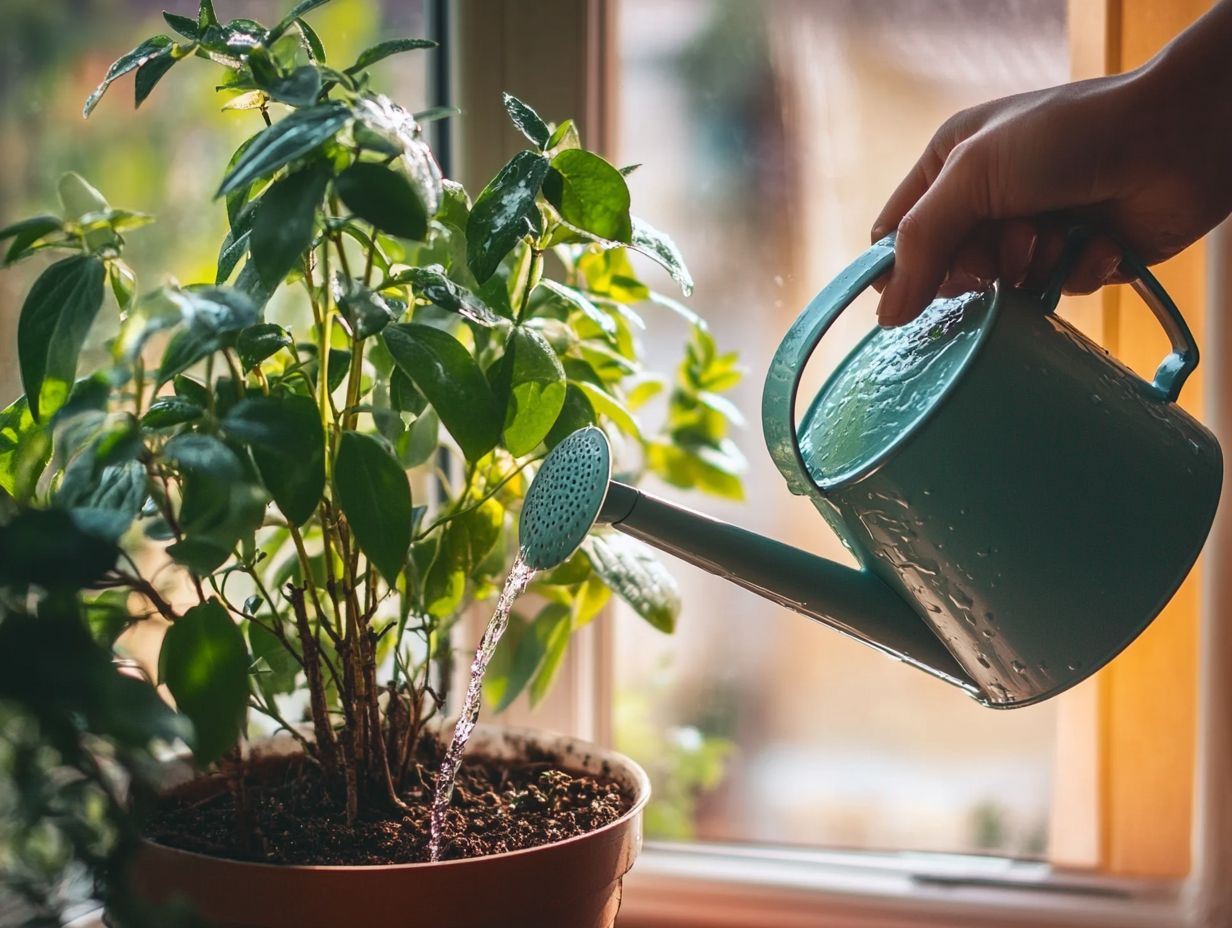
Minimizing negative effects when using tap water requires understanding chlorine levels and adopting specific watering techniques. These can help prevent issues such as root rot and standing water.
One effective method to reduce the impact of chemicals like chlorine is to let the water sit for at least 24 hours before using it. This simple step allows harmful substances to dissipate, making the water safer for your plants. Embracing best practices, such as ensuring your pots have adequate drainage holes, can prevent standing water, which can be detrimental to plant health.
By carefully examining soil moisture levels and using pots with proper drainage systems, you can cultivate healthy root systems. This allows your plants to thrive while minimizing the risks associated with chemical exposure.
Frequently Asked Questions
Can I Use Tap Water for Indoor Plants?
Yes, you can use tap water for indoor plants. However, there are a few things to keep in mind.
What are the things I should keep in mind when using tap water for indoor plants?
Tap water may contain chemicals such as chlorine and fluoride, which can be harmful to plants. It’s important to let the tap water sit for 24 hours before using it, as this will allow some of the chemicals to evaporate.
Can I use tap water directly from the faucet for my indoor plants?
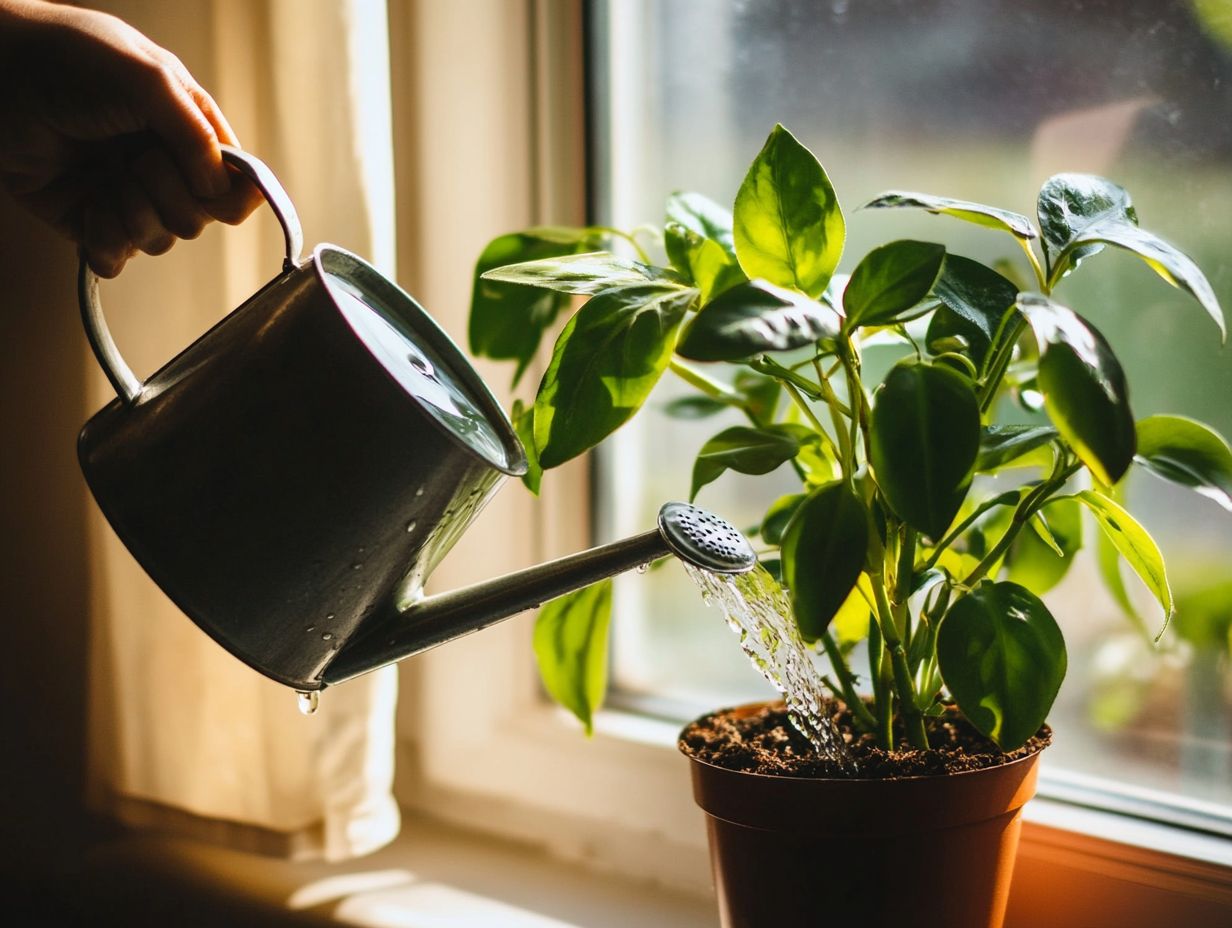
No, it’s not recommended to use tap water directly from the faucet for your indoor plants. Letting the water sit for 24 hours will help reduce the chemicals, but it’s still best to use filtered or distilled water if possible.
What if I live in an area with water that has a lot of minerals?
If you live in an area with water that has a lot of minerals, using filtered or distilled water is a smart choice for your indoor plants. This type of water can harm your plants by building up minerals like calcium and magnesium in the soil.
Are there any benefits to using tap water for indoor plants?
Tap water can be beneficial for your indoor plants. It contains small amounts of nutrients that help nourish them. However, keep an eye on your soil’s pH levels to ensure your plants stay healthy.
Should I use tap water for all types of indoor plants?
Not all indoor plants thrive on tap water. Some, like succulents and cacti, are sensitive to the chemicals in tap water and may need filtered or distilled water instead. Research the specific needs of your plants for the best results.

